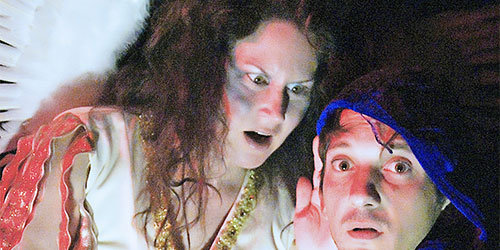By John Quinn

The Great Messenger (Cara Trautman) and The Messenger (Bailey Boudreau) in The Ringwald Theatre's production of Tony Kushner's two-part masterpiece, "Angels in America." Photo: Brandy Joe Plambeck.
The complete title of Tony Kushner's monumental opus is "Angels in America: A Gay Fantasia on National Themes." Did I write "monumental?" It is so big it's split into two plays, each of which runs over three hours. Is it self-indulgent? Yes. Is it bombastic? Yes. Is it utterly compelling drama? You better believe it. "Angels" received the Tony Award for Best Play of 1993 and 1994, plus the 1993 Pulitzer Prize for Drama.
The Ringwald Theatre mounted a remarkable production of "Angels in America, Part One" in February. To open the company's eighth season, that production has been revived, and is joined by "Part Two," subtitled "Perestroika." While the plays are considered to be producible separately, it's tough getting up to speed in "Perestroika" if you don't also catch "Part One: Millennium Approaches." The experience is greater than the sum of its parts.
"Angels in America" follows three intertwined stories. The time is 1985, the place is New York City. Prior Walter (Bailey Boudreau) is increasingly incapacitated by AIDS, and his lover, Louis (Matthew Turner Shelton), eventually abandons him. It would appear that Joe and Harper Pitt (Brenton Herwat and Meredith Deighton) are a straight-laced, Mormon couple, but each hides an inner torment. Joe is sexually in the closet, and Harper has turned to high doses of Valium to relieve her anxieties. The third plot introduces a fictionalized portrayal of the notorious, Communist-baiting attorney Roy Cohn (Dennis Kleinsmith). Obsessed with his alpha-male status, Cohn conceals his homosexuality and his HIV-positive status.
"Perestroika" begins as Louis begins seducing a reluctant Joe. They had an unlikely acquaintance from work – the U.S. Court of Appeals, Second Circuit, no less – but an encounter cruising Central Park leads them to Louis' apartment. Meanwhile, Joe's mother, Hannah (Jamie Warrow), alarmed by Joe's coming out, flies to New York to find both son and daughter-in-law AWOL. Harper's hold on reality is fragmenting.
Prior is also losing touch with reality. An angel (Cara Trautman) has appeared unto him, named him a prophet, and declares that God has abandoned the world because of "migration." Cohn's health has deteriorated and he checks into the hospital, only to find that his nurse is the ex-drag queen, "Belize" (Chris Jakob). Wouldn't you know – Belize just happens to be Prior's BFF.
Does this all sound unbelievable, in an over-the-top, soap opera-ish sort of way? That's the intent.
"Angels in America" is epic theater in classic Brechtian tradition. Kushner is less interested in his plot than in its messages. He sums up the whole enchilada by a single line in the epilogue: "The world only spins forward." It should come as no surprise that a self-described socialist would explore themes like conservatism versus progressivism and cast the likes of Roy Cohn and Ronald Reagan as the bad guys. That being said, the strength of his script is in its poetry, wondrous symmetry and acknowledgement that there are, after all, shades of grey. As director, Jaimie Warrow admirably carries out the playwright's vision, ably assisted by both cast and crew.
"Angels in America" invites us to compare and contrast. Bailey Boudreau strikingly marks Prior's passage from hollow-eyed madman to resolute crusader in parallel with Matthew Turner Shelton's equally well-limned transformation of Louis from callous cad to enlightened sympathizer. Nicely on point are Brenton Herwat and Meredith Deighton, as each explores his and her characters' flawed attempts to reconcile their emotional conflicts. Kushner's depiction of Cohn brings to mind Shakespeare's Shylock, another power-mad Jew. Both playwrights transcend stereotype to produce rounded characters that are at once both sympathetic and repellant. Dennis Kleinsmith's performance embodies that contrast.
As noted above, epic playwrights enjoy showing their audiences "how the sausage is made," reminding us that this is only a play. As of opening night, the scene changes (and there are a LOT of 'em!) are only running semi-smoothly, not through any fault of stage manager Sean McClellan, but because dim lighting hampers the effort. As dramatic as this work is, it's entirely consistent with its genre to – ahem – "lighten up."
Let's raise the question of relevance. Is "Angels in America" a period piece, given that anti-viral therapies have turned HIV from a death sentence to a manageable infection? Is its message of "healthcare inequality" blunted by the Affordable Care Act?
It's a tough call. Prior's stirring call for progress may not rally a generation that's a generation removed from the onset of the disease. But, in "Angels" context, Roy Cohn's evil is not his despicable career, but his unwillingness to publicly acknowledge his HIV status. That problem, I fear, remains with us.
REVIEW:
'Angels in America, Part Two: Perestroika'
The Ringwald Theatre
22742 Woodward Ave., Ferndale
8 p.m. Saturday, Sept. 6, 13, 20, 27
3 p.m. Sunday, Sept. 7, 14, 21, 28
8 p.m. Monday, Sept. 8, 15, 22, 29
3 hours, 15 minutes (with two intermissions)
$10-20
248-545-5545
http://www.theringwald.com










